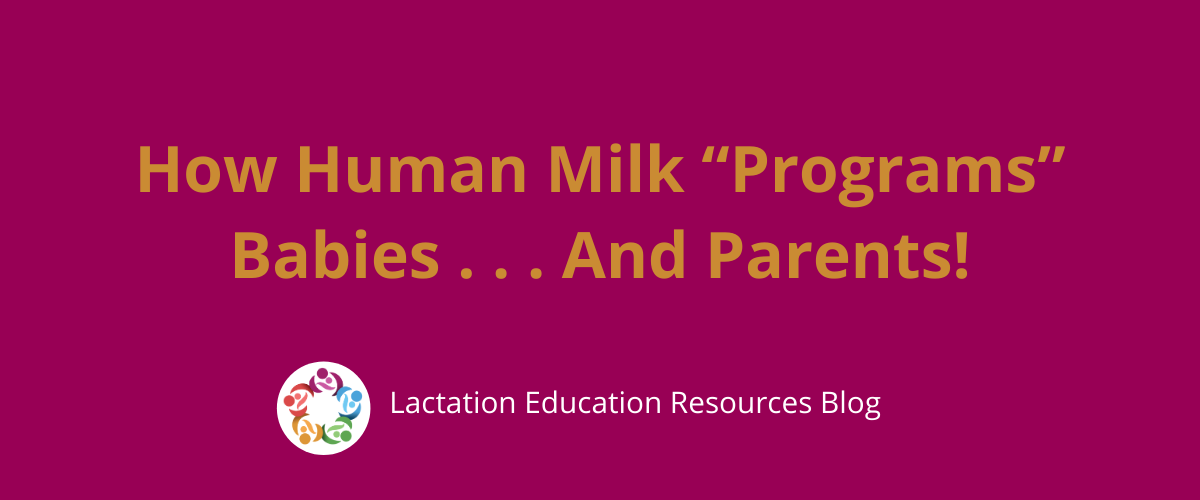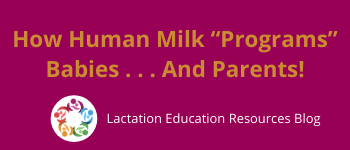How Human Milk “Programs” Babies . . . And Parents!


Epigenetics is a hot topic these days and discussed more and more in the lactation world - but what IS it? Why is it relevant to the perinatal period? And as experts in lactation, how should we understand and explain the role human milk might play in “programming” the epigenome?
Laurel Wilson, IBCLC, RLC, BSc, CLE, CLD is an experienced lactation consultant and speaker on perinatal health topics. Her new Lactation Education Resources class shares leading-edge research discoveries in the exciting new field of epigenetics. These discoveries are changing how we think about human milk. Below, she shares some key points about epigenetics and infant feeding:
Our DNA is not destiny: it’s just a starting point.
Only a small percent of disease comes directly from genetic origin. Many people are born with a genetic predisposition to disease; common examples include diabetes, heart disease, and many types of cancer.
But not all people born with the genes placing them at higher risk for a disease will develop it. Why?
“Epigenetic” literally means “above the gene.” Epigenetic changes take place when cellular elements interact with our genes to “flip the switch:” turn genes on or off, or increase or decrease how active they are. Environmental factors like how we are fed as infants, what we eat later in life, what physical activity we do, and how much stress we experience can all flip the switch on genes that affect our health. These epigenetic changes can persist throughout life. In some circumstances they can even be inherited by following generations.
There are multiple ways that genes can be turned on or off.
One example of a way genes can be turned on or off is through the function of molecules called microRNAs. The primary role of these regulators is to turn genes off and on.
MicroRNAs can survive very difficult conditions: they can survive pasteurization and even boiling, freezing, and acidic environments - like say, a baby’s stomach.
There is a very high level of microRNAs in human milk for the first 6 months after birth - this is a stream of genetic instructions passing from parent to baby via milk. In fact, microRNAs in human milk is the only time outside of sexual reproduction that genetic material is transferred from one person to another!
Breast/chestfeeding does not just affect the epigenetics of a baby: it also affects the parent.
There are over 700 maternal genes expressed during the postpartum period! Many of the hormones and hormonal changes involved in lactation - including prolactin, oxytocin, estrogen, and progesterone - communicate to the brain that parenting is happening, and alter gene expression in the brain.
No surprise: “Many of these genes are linked to reward pathways, to promote bonding and connection between parent and child,” says Wilson.
It is vital for us to understand and communicate about this research accurately.
We are often called upon - by the families we serve, other health professionals, journalists, and others - to discuss the unique properties of human milk and breast/chestfeeding. Is it just food? Why work hard to promote and protect human milk feeding?
We all know that beyond nutrition, milk provides a multitude of immune factors, hormones, prebiotics, probiotics, and anti-microbials, many of which play a role in the numerous lifelong health effects of human milk feeding.
But we are now learning that factors in milk may be doing something more: changing the very genetic expression of both baby and parent in ways that may have lifelong health effects.
Wilson is skilled at translating research findings in a clear and accessible way, so you can easily understand and communicate this information yourself. And it’s important that more people understand the epigenetic implications of infant feeding. "The good news is that the epigenome is changeable,” she says, “and once we begin to make changes we can see positive changes for our future generations.”
Learn more about epigenetics, the infant microbiome, and more in “Activate: How Human Milk and Breast/Chestfeeding Activates Our Genes Through Epigenetics”, a new course at Lactation Education Resources.
Enroll Now
Enroll Now
By accepting you will be accessing a service provided by a third-party external to https://www.lactationtraining.com/
